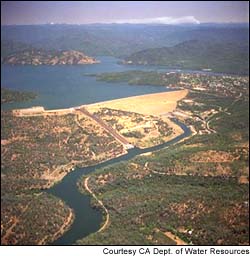forum
library
tutorial
contact

Power to Regulate Hydropower may be Waning
by Margot HigginsEnvironmental News Network, May 16, 2001
|
the film forum library tutorial contact |

|
Power to Regulate Hydropower may be Waningby Margot HigginsEnvironmental News Network, May 16, 2001 |
 States, tribes and federal agencies may have
less power to impose environmental
regulations on hydropower operations if a
proposal by the Federal Energy Regulatory
Commission is enacted.
States, tribes and federal agencies may have
less power to impose environmental
regulations on hydropower operations if a
proposal by the Federal Energy Regulatory
Commission is enacted.
The proposal follows a request by Sen. Frank Murkowski, D-Alaska, to reduce the cost and time of obtaining hydropower licenses.
FERC issues and oversees operating licenses for approximately 2,500 privately owned hydropower dams across the country. Over the next decade, licenses for more than 400 dams harnessing 130 different rivers will expire.
Conservation groups claim that while the FERC has significant authority to protect and restore environmental and recreational values along the rivers, the proposal could dramatically weaken environmental protections associated with the hydropower licensing and re-licensing process.
"A license to dam a public river is a privilege, not a right," said Matt Sicchio, coordinator for the Hydropower Reform Coalition, a group of more than 70 conservation and recreation organizations working to protect rivers impacted by hydropower dams.
 FERC's report to Congress, entitled "Report on Hydroelectric Licensing Policies, Procedures,
Procedures and Regulations," proposes legislative and regulatory changes which would have
several consequences for rivers, wildlife and recreational opportunities, conservation groups
claim.
FERC's report to Congress, entitled "Report on Hydroelectric Licensing Policies, Procedures,
Procedures and Regulations," proposes legislative and regulatory changes which would have
several consequences for rivers, wildlife and recreational opportunities, conservation groups
claim.
Under the FERC proposal, state agencies would have less power to enforce the Clean Water Act.
"FERC proposes to have the ultimate say about the definition of water quality," said Andrew Fahlund of American Rivers. "Although water quantity is a fundamental characteristic of water quality, FERC does not want to consider water quality condition in setting minimum stream flows. How can you have good water quality without water?"
Fahlund said the proposal is directly tied to an effort to meet California's energy woes this summer. In recent weeks, federal agencies have released an emergency plan for the region, which includes cutting back several key salmon protection measures in order to increase electricity produced by federal hydro-electric dams on the Columbia and Snake rivers.
Conservation groups claim the plan portends fewer environmental regulations at privately owned dams.
During the re-licensing process, federal and state agencies can set minimum protection for water quality and flow, fish passage, land protection and other factors. They also can require the construction of fish ladders and other structures to protect ecological health and recreation. Once issued, hydropower licenses are valid for up to 50 years.
"Because dams were given licenses 30 to 50 years ago, they have never been subject to modern environmental laws," Fahlund said. "What we seek in re-licensing is bring those antiquated projects up to modern standards."
learn more on topics covered in the film
see the video
read the script
learn the songs
discussion forum
